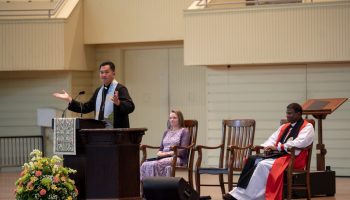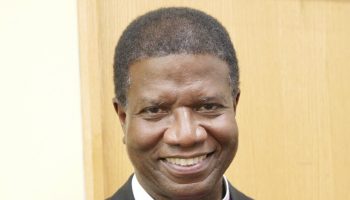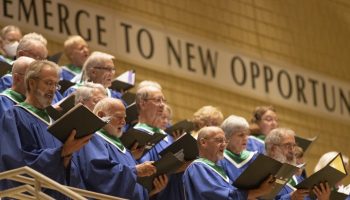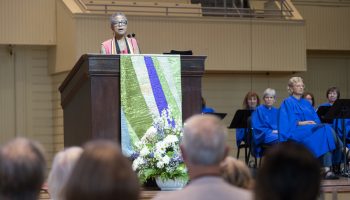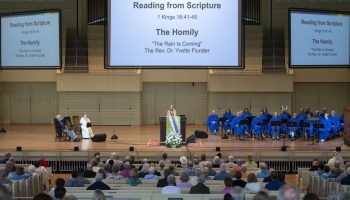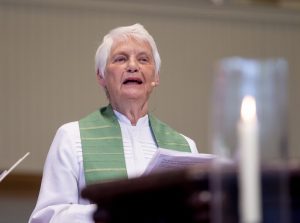
“I have five days this week to preach through the seasons of the church year,” said the Rev. Barbara K. Lundblad at the 9:15 a.m. Monday Ecumenical Service in the Amphitheater. “I am preaching from Advent through Pentecost, so you won’t have to go to church for a whole year.”
Her sermon title was “Grace: A Word Out of Place,” and the church season was Advent. The Scripture reading was Isaiah 35:1-10. Isaiah will be the first lectionary reading for each Sunday in Advent this year.
“These words are beautiful, but they should not be here,” Lundblad said. “Amid war and desolation, there comes a surprise, a poem about hope after a poem of destruction.”
Isaiah 34 is a poem of destruction. These words weren’t just for the enemies of Israel, but for the people of Jerusalem and Judea as well.
Lundblad read verse 9, “ ‘And the streams of Edom shall be turned into pitch, and her soil into sulphur; her land shall become burning pitch.’ And this was before global warming.”
Chapter 35 in Isaiah shifts gears without a break.
“ ‘The wilderness and the dry land will be glad.’ ” she said. “The desert will bloom and waters will flow in the wilderness. People with disabilities will not be dissed. A blind woman and her dog will lead the parade, a veteran in a wheelchair will serve communion, a speechless person will sign the service and a deaf person will paint on the walls.”
These words were put in Isaiah at a time that the people of Israel had no reason for hope.
“Scholars think that maybe it was moved from Second Isaiah, but who moved it?” Lundblad asked. “Scholars have not answered that question, so I think that the Spirit hovered over the scribes and said, ‘Put it here before anyone is ready to interrupt the narrative of despair.’ ”
These passages in Isaiah expose evil and injustice and envision something new — justice and hope.
Charles Campbell, in The Word Before the Powers: An Ethic of Preaching, said that if a preacher only preaches a word that exposes, it leaves the people in despair. If the preacher only envisions what could be, people will ask, “What planet are you living on?”
Lundblad then turned to the theme of grace.
“When you take the ‘g’ off the word ‘grace,’ you have ‘race,’ ” she said. “What does it mean to think about race with grace?”
Lundblad visited Berlin earlier this year and visited a Gestapo prison that is now a museum with a timeline of the rise of Nazism. It chronicles the despair of the German people after World War I, the election of Hitler as chancellor and cartoons demeaning Jews, homosexuals, the Roma and others.
She was stopped by a poster of a family with a father whose arm is around his son’s shoulder, a mother with a baby in her arms and a little girl in front. Behind them, the German eagle had its wings spread to embrace and protect them. All of the people were light skinned with blond hair.
“Without speaking, the poster said that everyone should look this way,” Lundblad said. “A mother, father, three children — light skinned and blond hair, and those who don’t fit should be eliminated.”
Lundblad told the congregation, “These are very hard times, and language is part of the problem. Would I have spoken out against what the Nazis did if I was there? I can never know.”
She said she had to speak out now in the face of the hatred and racism in the United States.
“What can my words do when I don’t even have a Twitter account?” Lundbald said.
In The Source of Self Regard: Selected Essays, Speeches and Meditations, Toni Morrison said that people hunger for a way to articulate who they are and what they need, but language is not neutral; it is embedded in history.
Lundblad repeated that sentence: Language is not neutral; it is embedded in history.
“Our president called Baltimore a disgusting, rat-infested place,” she said. “He called sanctuary cities crime-infested and immigrants are infesting our cities. That is a key word — infest.”
While she was visiting Deer Isle, Maine, this summer, there was an infestation of brown-tail moths.
“It is alright to call that an infestation,” Lundbald said. “Insects might infest, rats might infest. Human beings do not infest — ever.”
“Language is not neutral,” she said again. “The president turned immigrants and people who live in the inner cities into vermin, people he wants to get rid of. The man in El Paso wanted to get rid of Mexicans and Mexican Americans.”
Lundblad, quoting Martin Luther King Jr., said that the ultimate logic of the evil of racsim is genocide.
“There are a lot of white people here; I am one of them,” she said. “We can’t expect people of color to carry the burden of racism. I know there are white people who are afraid because the people coming here don’t look like the poster in Berlin.”
Lundblad told the congregation: “I need more courage to do what I can do even without a national platform. We all have spheres of influence — relatives, card clubs, yoga classes, churches — where we can make a witness and expose demeaning language.”
Exposing is easier than envisioning.
“What is it about this country that we cherish?” she asked. “It won’t help to talk about white privilege because white people respond emotionally and say, ‘Don’t blame me.’ ”
She said the United States needs a vision that includes people who are not like the people in the Berlin poster.
Lundblad has roots in the farms of Iowa, and lived for many years in New York City, where she was often the only white person on the subway train.
“I have respect for the hard-working farmers of Iowa, the lobster fishermen in Maine, for Wynton Marsalis and purple-haired Megan Rapinoe,” she said. “I see women of color pushing strollers, carrying white children and the Somali woman who cares for my Aunt Gertrude in her care home. Who will take care of our children and elderly if it were not for immigrants?”
Lundblad said the United States was not better than other countries, but different from other countries.
“Can we share a vision with the people who are afraid that this country won’t look like the poster?” she asked. “We have to share that vision, touch people where their hearts are.”
She concluded the sermon by singing the Louis Armstrong version of “What a Wonderful World,” and invited the congregation to join the final chorus.
“I see trees of green, red roses too / I see them bloom, for me and you / And I think to myself / What a wonderful world. / I see skies of blue and clouds of white / The bright blessed days, the dark sacred nights / And I think to myself / What a wonderful world. / The colors of the rainbow / So pretty in the sky / Are also on the faces / Of people going by / I see friends shaking hands, saying how do you do / They’re really saying, I love you. / I hear babies cry, I watch them grow / They’ll learn much more / Than I’ll ever know / And I think to myself / What a wonderful world / Yes, I think to myself / What a wonderful world.”
The Rt. Rev. V. Gene Robinson, vice president of religion and senior pastor, presided. The Rev. Scott Maxwell, incoming pastor at St. John’s Lutheran Church in Linthicum, Maryland, read the Scripture. The Motet Choir sang “What Shall I Render,” by John Ness Beck as the introit. For the anthem they sang “Lead, Kindly Light,” by Howard Helvey. Jared Jacobsen, organist and coordinator of worship and sacred music, conducted the choir. The Robert D. Campbell Memorial Chaplaincy provides support for this week’s services.

